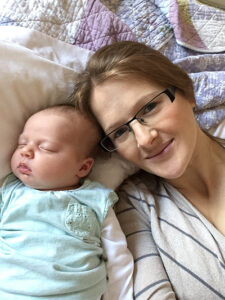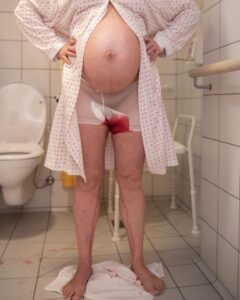There is a whole world of postpartum and postnatal experiences that you are unlikely to have heard much, if anything, about.
Why?!
In pregnancy we are barely given any space to explore and prepare for birth, let alone discuss the time that follows. A midwife appointment is a whistle stop tour of tickboxing and measurements, and the time after birth is barely even considered. You will see a midwife in the early days/weeks but unless you have specific questions or concerns you want to voice, there is still limited time available to really process how you are feeling. (Remedy this with a comprehensive Hypnobirthing course!)
A lot of the postnatal symptoms and experiences create embarrassment, shame or fear of judgement (thanks patriarchal society!) so as ever we remain polite, try not to worry or inconvenience anyone and muddle through as best we can.

We have been raised to keep things to ourselves, to keep private things private. So it’s a self fulfilling prophecy that because we don’t talk about it, we assume we are the only one going through it and become scared to open up in case we look abnormal, crazy or like a shit parent. It’s a lose lose situation.
The pathetic waste of time we call the “postnatal check” at 6/8 weeks is completely ineffective at truly providing a helpful and constructive support opportunity. Anyway, by this point the reassurance would be too little too late.
SO…..as always I’m here for unfiltered honesty and opening up conversations about the stuff that we all go through, so even when things feel uncomfortable, tough or frustrating, you at least feel a little more knowledgeable with some realistic expectations.
(*technically postpartum refers to the new mother/parent and postnatal refers to the newborn baby. In the UK we tend to only use ‘postnatal’ and so that is what I will use here.)
“The fourth trimester has more in common with the 9 months that came before than with the lifetime that follows” Susan Brink
After Pains
As your uterus contracts back down to its pre-pregnancy size (uterine involution), you are likely to get aches and cramps for a few days. Some people, particularly after their first birth, are not bothered by them, but for some they are incredibly painful and may even feel like contractions. They tend to be worse with subsequent births and may be much stronger when you are breastfeeding. This is because breastfeeding creates a release of oxytocin which is what stimulates these contractions. They have usually subsided by around day 3.
Top tips:
Take painkillers if you need to, these cramps really can be intense so don’t think you should just push through in order to be strong…you had a baby, trust me, you’re strong!
- Stay hydrated
- Go to the toilet regularly, a full bladder can make after pains worse
- Use heat in the form of a hot water bottle to ease cramps
Night Sweats
 Dramatic postnatal hormone shifts can cause hot flushes that result in serious excess sweating. For most people this happens at night (hello night sweats!) but can also happen at other times of day. A 2013 study (Thurston, 2013) found that a third of people experience ‘hot flashes’ after birth and that they are at their worst around 2 weeks postpartum, gradually declining after that. At best it leaves you feeling clammy and in need of a shower, at worst it can be quite alarming and even scary if you are not expecting it. You are not alone, people around the world are sweating with you!
Dramatic postnatal hormone shifts can cause hot flushes that result in serious excess sweating. For most people this happens at night (hello night sweats!) but can also happen at other times of day. A 2013 study (Thurston, 2013) found that a third of people experience ‘hot flashes’ after birth and that they are at their worst around 2 weeks postpartum, gradually declining after that. At best it leaves you feeling clammy and in need of a shower, at worst it can be quite alarming and even scary if you are not expecting it. You are not alone, people around the world are sweating with you!
Top tips:
- Sleep on a towel and use lightweight bedsheets
- Wear lightweight clothing or even sleep in your underwear, have spare clothing nearby
- Ensure your bedroom isn’t too warm at night (balance this with an appropriate temperature for your baby too)
- Stay hydrated
Bleeding (lochia)

Regardless of how you give birth (vaginally or via Caesarean), you will experience bleeding afterwards. Also referred to as lochia, it is a mixture of blood, mucus and uterine tissue. In the first few days it is likely to be extremely heavy and you may also pass some dark clots. This is normal but can be alarming if you’ve not seen it before. If you feel unwell or are worried or unsure, contact your midwife. It can be helpful to take pictures of clots in the toilet or on your pad.
Bleeding lasts for 6 weeks on average but will vary hugely from person to person. It will go from heavy red blood to a less heavy, darkish brown or pinkish red blood, eventually being more like the pink/brownish stained discharge you’re used to at the end of a period.
Take note:
It is normal for bleeding to decline/stop and then become a bit heavier again. This is quite common after you have done something a bit more active such as going for a walk
Alien Vulva!
 Don’t worry, there’s no UFO take over, but your vulva may feel like it’s really not your own. Someone even told me theirs felt like a “firm jacket potato”! It’s normal for your vulva/perineal area to feel swollen and bruised, and there is likely to be pain or discomfort in any areas where you experienced a tear/episiotomy and stitches. Follow advice on how to keep the area clean and dry and go gently and takes things slow in the early days. You may find a cold compress or ‘padsicle’ eases swelling but remember that warmth aids blood flow and recovery.
Don’t worry, there’s no UFO take over, but your vulva may feel like it’s really not your own. Someone even told me theirs felt like a “firm jacket potato”! It’s normal for your vulva/perineal area to feel swollen and bruised, and there is likely to be pain or discomfort in any areas where you experienced a tear/episiotomy and stitches. Follow advice on how to keep the area clean and dry and go gently and takes things slow in the early days. You may find a cold compress or ‘padsicle’ eases swelling but remember that warmth aids blood flow and recovery.
The First Poo/Wee and Bowel Changes
It’s very normal to experience shifts and changes in your bowels such as gas, bloating and constipation. Constipation is more common after a Caesarean than a vaginal birth but is very normal for anyone. Try to prevent or alleviate symptoms by drinking lots of water and including fibre in your diet. It can be tempting to resist going to the toilet for a poo after birth and many people are anxious about it, especially if they’ve had a tear or stitches. Try to listen to your body and go when you have the urge, use relaxation and breathing techniques to reduce tension and be reassured that it’s VERY unlikely that you’ll affect any tear/stitches.
Your midwife will advise that you should have had your first good wee within approximately 6 hours of birth. This is something many people dread as the area feels rather delicate after giving birth to a baby and, especially if you’ve had a graze or tear, it MAY sting. It’s rarely as bad as you’ll be building it up to be and it’s essential you stay hydrated and go to the toilet regularly.
Top tip:
Pour warm water across your vulva or down your bum crack as you wee to dilute the flow of urine and reduce stinging. You only need a jug but you can buy fancy peri-bottles that direct water towards your vulva if you really want to

Incontinence
Incontinence after having a baby is one of those problems that the patriarchally driven society has taught you is inevitable. “Oh well, you’ve had a baby, better just get on with it”. Well bollocks to that. Yes incontinence is common after birth, but no it should not be accepted as just a normal part of life now.
It is a more common after a vaginal birth but anyone can experience it, and you’re more likely to have issues if you struggled with it in pregnancy, if you had a particularly long labour or you had an assisted birth.
Bowel incontinence is a far less common problem but can happen, particularly after experiencing a 3rd or 4th degree tear. This is more common after an assisted birth as the process of using ventouse/forceps increases the risk of a higher degree tear.
Top tips:
- Seek support from a qualified women’s health physio, unfortunately not part of standard postpartum support in the UK
- Do pelvic floor strengthening
- Drink plenty of fluids despite being reluctant to
- Avoid caffeine
- Avoid heavy lifting
Haemorrhoids (piles)
 Haemorrhoids are swollen, bulging veins in your rectum. They can be internal or external, and cause bleeding, itching and sometimes significant pain. You may have experienced them during pregnancy and now they are the same/worse after birth, or they may be a new postpartum thing for you.
Haemorrhoids are swollen, bulging veins in your rectum. They can be internal or external, and cause bleeding, itching and sometimes significant pain. You may have experienced them during pregnancy and now they are the same/worse after birth, or they may be a new postpartum thing for you.
They are caused by increased pressure from your growing baby, increased blood flow and then further downward pressure during the birthing process. Over time it is likely they will reduce and even go completely, but if you are struggling or they are not getting better speak to your GP or midwife for advice.
Top tips:
- Increase the fibre content of your diet and drink plenty of water
- Use creams/medications. Some you can get over the counter, others you need a prescription for
- Try not to strain when having a poo, use breathing techniques and relax your body
Hairloss
 During pregnancy your levels of oestrogen and progesterone increase which pauses the natural hair shedding (‘telogen’) phase of your hair renewal cycle. As a result many people find their hair is much thicker and glossier during pregnancy. After birth when hormones gradually return to normal, this paused state resumes and all the hairs that were prevented from falling out now start to shed. It can be quite alarming as it happens all at once and can result in visible thinning or hair loss, though everyone is unique. For most people hair growth eventually returns to normal.
During pregnancy your levels of oestrogen and progesterone increase which pauses the natural hair shedding (‘telogen’) phase of your hair renewal cycle. As a result many people find their hair is much thicker and glossier during pregnancy. After birth when hormones gradually return to normal, this paused state resumes and all the hairs that were prevented from falling out now start to shed. It can be quite alarming as it happens all at once and can result in visible thinning or hair loss, though everyone is unique. For most people hair growth eventually returns to normal.
Gas Pains
Gas build up is particularly common after a Caesarean and it can result in very painful and sometimes quite alarming shooting pains in the abdomen. These gas pains can also be “referred” which means they can be felt in other places in the body. Over 30% of people experience pain in their shoulder and another common location for referred pain is in the chest. The reasons for gas build up after a Caesarean include slowed bowel movements, reduced exercise/movement and altered diet. It is normal for trapped gas to remain for up to a week after a Caesarean birth.
Top tips for reducing gas pain:
- Chewing gum
- Herbal teas such as peppermint
- Gentle movements such as rocking in a chair
- Staying hydrated
- Eating foods that support digestion
Postnatal Rage
 Sleep deprivation, hormone shifts and the complex transition into parenthood can contribute to increased outbursts of anger and rage. There is a huge amount of shame and guilt associated with this very common and normal part of postnatal mental health. It’s rarely discussed in a society where being gentle, feminine and calm is celebrated to an oppressive degree. You may feel on edge and irritable, lose your shit over seemingly small things and have difficulty controlling your temper, in a way that is not characteristically normal for you. It can be a sign of anxiety or postnatal depression. Seek advice if you are concerned or struggling to cope.
Sleep deprivation, hormone shifts and the complex transition into parenthood can contribute to increased outbursts of anger and rage. There is a huge amount of shame and guilt associated with this very common and normal part of postnatal mental health. It’s rarely discussed in a society where being gentle, feminine and calm is celebrated to an oppressive degree. You may feel on edge and irritable, lose your shit over seemingly small things and have difficulty controlling your temper, in a way that is not characteristically normal for you. It can be a sign of anxiety or postnatal depression. Seek advice if you are concerned or struggling to cope.
Intrusive thoughts
Unwanted, recurring, negative thoughts and images can be distressing and cause a lot of shame, worry and paranoia. They are extremely common and can often include thoughts around harming your baby. They are not an intention to cause harm and do not mean you are at risk to your baby but can be a sign of anxiety or depression so seek advice if you are concerned or struggling to cope.

No Rush of Love
It’s normal for a cocktail of hormones (dominated by oxytocin) during and immediately after birth to facilitate that immediate rush of overwhelming love for your newborn. It’s in all the pictures you see and the stories you hear. What you’re not seeing or hearing is just how bloody normal it also is to NOT experience that feeling.
Bonding with your baby can take time, it can be a gradual process that happens in the days, weeks and even months after birth. One day at a time. Unconditional love is unconditional love, however long it took to develop.
You are NOT crazy. You are NOT abnormal. You are NOT broken. You are NOT a bad parent.
“…assuming that the bond compels the care, and not that the care brings the bond — sets up new parents for more frustration and insecurity than necessary” Joanna Mang
Other things people experience:
- Phantom kicks
- Major thirst during breastfeeding
- Increased body odour
- Swollen legs and feet
- A sense of dread as the evening (‘witching hour’) approaches
If you are concerned about anything at all, feel like you can’t cope or are experiencing anything that doesn’t seem right, speak to a midwife or your GP. You will never be judged for asking questions and getting something checked.
Support:
PANDAS Foundation for pre and postnatal depression information
Maternal OCD for information and support
Association for Postnatal illness (APNI) for support, education and information
References:
Thurston, R. et al. (2013) Prospective evaluation of hot flashes during pregnancy and postpartum.
